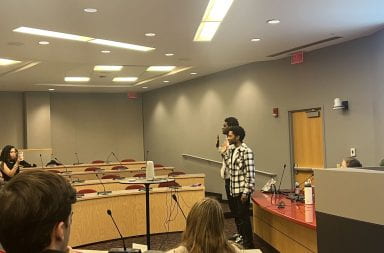The Ohio State Undergraduate Student Government president and vice president receive far greater compensation for their work than the elected officials at six of the other 11 Big Ten universities.
While several other schools also offer financial benefits to a select few of their executives, only OSU offers a scholarship equal to the cost of in-state, full-time, undergraduate tuition, room and board up to the cost of the least-expensive four-person resident hall room arrangement and the cost of books and supplies, according to OSU’s guidelines for USG presidential and vice presidential scholarship.
The monetary value of the scholarships changes from year to year. The budget for books, supplies and tuition is determined by Need Analysis, while University Housing determines the room and board fees, for which the credit need not be applied to on-campus housing, according to the scholarship guidelines.
The tuition portion of the scholarship includes mandated fees such as those for Central Ohio Transit Authority, student activity, recreational sports and Ohio Union, but does not include optional fees like student health insurance, student legal insurance, parking or athletic tickets.
The USG president and vice president are permitted, however, to purchase a faculty parking permit although they have to pay the faculty rate of $756 annually, according to the guidelines and the OSU CampusParc website.
Tuition and fees for an Ohio resident for the 2012-13 school year cost $10,037, and room and board for the least-expensive four-person residence hall room cost $5,620 for two semesters. Books and supplies cost about $1,248 for the academic year, totaling $16,905 for the year, according to OSU Undergraduate Admissions website and the University Residences and Dining Services website.
The funding for the scholarships comes in part from the Richard Mall Scholarship Endowment and in part from the Office of Student Life, according to the scholarship guidelines and Student Life director of student activities and orientation Matthew Couch.
USG President Taylor Stepp, a third-year in public affairs, said that the scholarship does give him more freedom to fill his duties.
“It does certainly help me represent students given the fact that I don’t have to take on a huge amount of debt,” Stepp said.
He said OSU gives its elected officials larger benefits in part because the USG shared-government model is more time consuming and demanding. He said he spends “50-plus hours per week” on USG-related tasks and that he is contractually not allowed to hold another job.
“The biggest difference between Ohio State’s student government and other student governments (is that) we have to put more time, energy and policy focus into our dealings,” Stepp said.
Other Big Ten schools that offer their student government officials some kind of financial compensation include Indiana University, Pennsylvania State University and University of Iowa.
The Indiana University Student Association offers its president, vice president of administration, vice president of congress, treasurer, chief of staff and funding board co-directors $3,000 each in the form of a paycheck. The funds come from student fees that are allocated by the Committee for Fee Review, according to the IUSA website and the IUSA Chief of Staff Augustin Ruta.
At Penn State, the University Park Undergraduate Association president receives a $3,500 scholarship that is funded by the Office of Student Activities. That office receives its funding from Penn State Transportation Services’ parking division, meaning “any money received from parking tickets on campus goes into their office,” said UPUA president Courtney Lennartz in an email.
The University of Iowa Student Government splits $40,000 proportionally among 12 people, including the president and vice president and most of the executive staff. The money comes from student activity fees, and student government itself allocates the funds among the 12 officials, said Nic Pottebaum, the UISG president.
Some Big Ten schools, however, do not have these benefits. University of Michigan and Northwestern University do not provide their elected student government officials with either scholarships or paychecks.
Michigan’s Central Student Government, however, provides its president and vice president with parking passes worth $25.25 per month and given to them by the vice president of Student Affairs, said Omar Hashwi, the CSG vice president, and Michigan’s Parking and Transportation Services.
OSU provides the scholarships to allow the president and vice president to “fulfill their duties,” according to the scholarship guidelines.
“The funding provided to presidents and vice presidents is a scholarship based upon their proven and future merit as student leaders in their respective organizations. The funding does not represent compensation for employment, as student government leaders are not employees,” according to the guidelines.
Some OSU students think that the large compensation for USG officials is justified.
“If they’re doing their job well and doing programs that actually benefit the school, then I think compensation isn’t out of the question,” said Johnny Krammer, a first-year in computer science and engineering.
Krammer said scholarships make more sense as compensation than paychecks given the student government officials are working for the students.
“I think scholarships is the way to go because they’re doing work for the school,” he said.
Other OSU students agreed that the scholarships are OK.
“It is a big time commitment and that keeps them from working, or other ways of providing for themselves, and school,” said Rosa Nemec, a fourth-year in engineering. “I think a scholarship is more applicable because we’re here for school, whereas a paycheck you can use for other things other than school.”
Select members of the student governments at Michigan State University, University of Wisconsin, University of Minnesota and Purdue University did not respond to emails requesting information. University of Illinois’ student government and a representative from the Association of Students of the University of Nebraska did not return calls requesting information.


